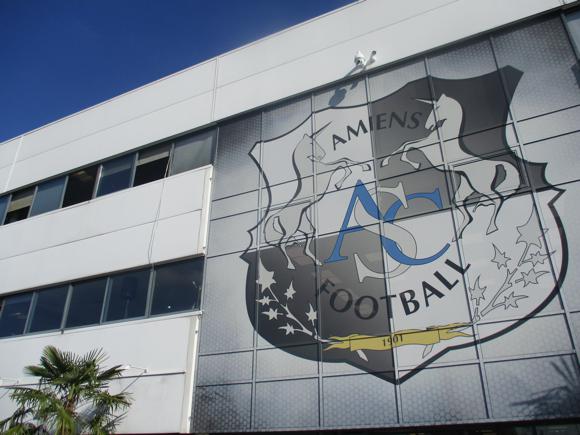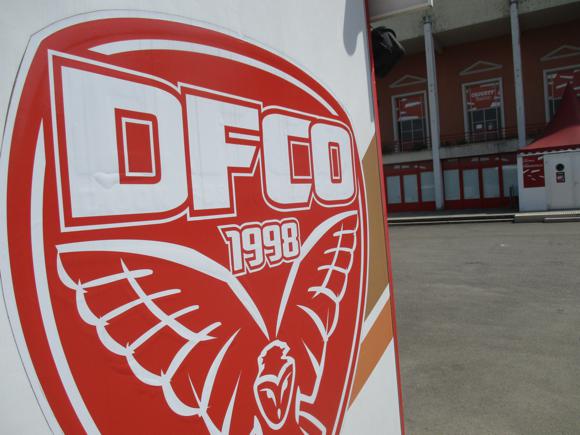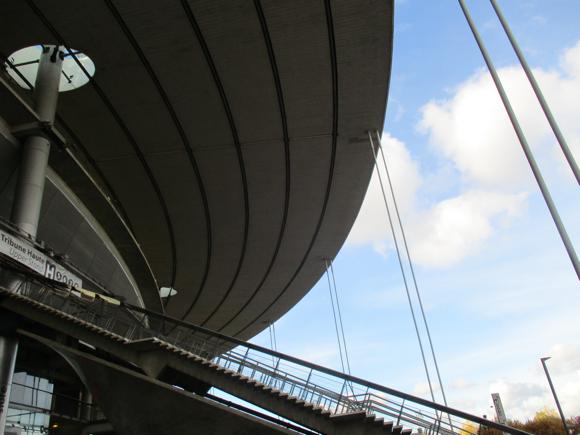A fan’s guide – the club from early doors to today
Qualifying for the Champions League in 2024, Stade Brestois 29 are the flagship club of the Breton port of Brest, whose previous short spells in the top flight barely reflect a colourful history of star names and long-suffering support.
David Ginola, Franck Ribéry and Júlio César all ran out in the white and red of Brest in its various guises, the club going through two name changes since its formation in 1950.
Generally considered to be the successors of Amoricaine de Brest founded in 1903, Stade Brestois were, in fact, an amalgamation of five clubs supported by the local Catholic Church. Based in this area of St Marc east of town, Amoricaine had moved into the ground built for them on rue de Quimper in 1922.

Stade Brestois inherited Amoricaine’s colours, stadium and fan base, although nearby rivals AS Brestois were also a top amateur team at the time. Two unremarkable decades passed before veteran midfielder Alain de Martigny brought a professional approach to Stade Brestois in the late 1970s.
After a first promotion to Ligue 1 in 1979, then relegation, de Martigny took over a coaching role, getting Brest back up in one season before he headed off to Spain to work as assistant to Michel Hidalgo when France lit up the 1982 World Cup.
By now, Brest had municipal backing, the City buying up and modernising the stadium, renaming it Stade Francis-Le Blé after a recently deceased mayor, the rebranding the club Brest Armorique.

The money attracted the likes of striker Roberto Cabañas and defenders Júlio César and José Luis Brown, all South American stars at the 1986 World Cup, to come to a rainy part of north-west France to play their football. Crowds remained modest and Brest barely blipped past mid-table.
In 1988, they went down, and their immediate return persuaded a young David Ginola to try his luck there. With later World Cup winner Stéphane Guivarc’h just breaking through and former Brest and Red Star Belgrade midfielder Slavoljub Muslin in his first coaching job, the team had potential but financially, the club was on thin ice.
Forcibly relegated in 1991, Brest Armorique ended life in ignominy, a pitch invasion by fans putting a stop to a second-tier derby game with Guingamp.
Playing for reformed Stade Brestois 29, reserve players battled in the third, then fourth, tiers as gates dipped into the hundreds. An emotional plea to de Martigny on the part of the club, due to celebrate a painful 50th anniversary in 2000, helped Brest climb back to the third flight and crowds click back up to 4,000.
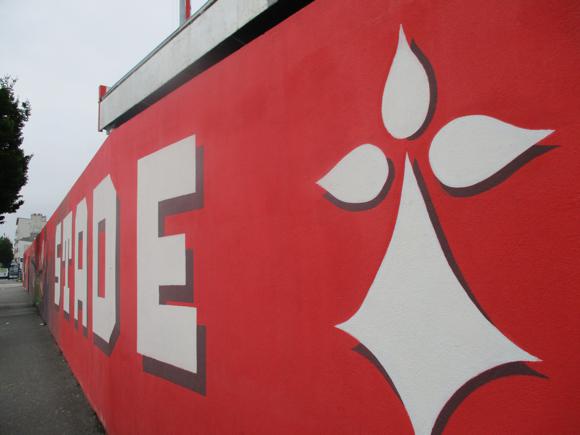
In 2003, a young Franck Ribéry, just turned 20 and still an amateur, arrived from Alès and set the Stade Francis-Le Blé alight. Brest gained promotion to Ligue 2 and even enjoyed a cup run, Ribéry then heading on to Metz and international fame.
A steady climb led to Ligue 1 promotion under much-travelled coach Alex Dupont in 2010. A midfield controlled by Bruno Grougi, who would go on to make 300-plus appearances for Brest, and goals from France U-21 striker Nolan Roux got the club back to the top flight after 20 years – and just about kept them up in 2010-11.
Brest held on for two more seasons before the inevitable drop. Recalling Dupont in 2013 failed to ensure a swift return – it would take the phenomenal strike rate of Gaëtan Charbonnier in 2018-19 to push them back up. The ex-Reims forward hit 27 goals in 37 league games, ensuring promotion for coach Jean-Marc Furlan, his fourth such success with two different clubs.

Furlan left Brest in the close season, long-term Dijon coach Olivier Dall’Oglio coming in to steer the club clear of relegation in 2019-20 – but it was the hiring of former Lyon and Sunderland midfielder Éric Roy in January 2023 that proved to be the masterstroke. Last in charge of a club, his home-town team of Nice, more than a decade ago, Roy had most recently been employed as sporting director at Watford.
The man who made the decision was Brest owner Denis Le Saint, whose family firm is the second-biggest produce delivery firm in France. Having overseen the club’s return to Ligue 1 in 2019, locally born Le Saint knew he needed to elevate the team to the next level or risk seasons of mediocrity followed by relegation.
Behind the scenes, Le Saint was (and is) planning to build a new stadium, rather than revamp the quaint but limited Stade Francis-Le Blé. Roy turned things around almost immediately, his charges going five, then six games unbeaten to extricate themselves from the relegation zone.
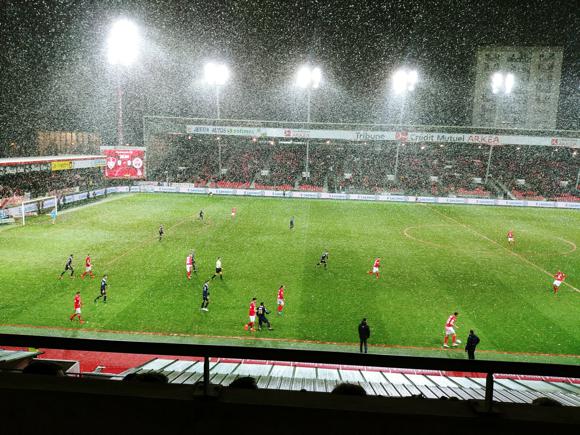
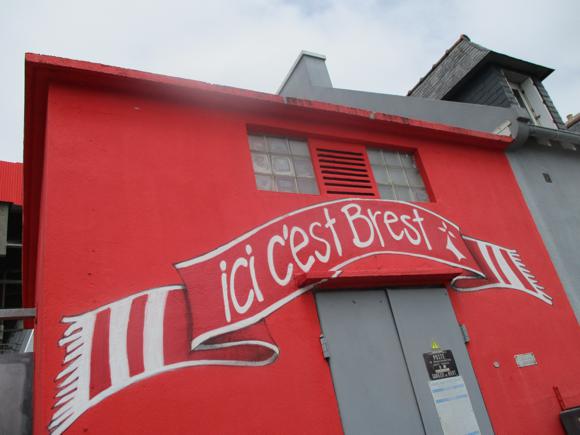

The momentum continued into 2023-24. Key to the sea change were combative midfielder Mahdi Camara, a graduate of the St-Étienne academy, who had come to Brest on loan in 2022 and then made the role his own, and experienced Dutch keeper Marco Bizot, who kept 13 clean sheets.
A 13-game unbeaten run either side of Christmas included a 2-2 draw at PSG, Brest coming back from 0-2 down to battle for a deserved point. If Brest hadn’t lost at Lyon, the hosts reversing a 1-3 scoreline to sneak a 4-3 win with a very late controversial penalty, Roy’s side might have fought Monaco for runners-up spot.
A best-ever Ligue 1 season, however, rewarded Brest’s loyal fans and ambitious owner Denis Le Saint for putting his faith in Éric Roy. Before the start of the 2024-25 campaign, Brest had galvanised their defence by bringing in tough Breton centre-back Julien Le Cardinal. With Real Madrid, Barcelona and Manchester City potential opponents in the new-format Champions League, Brest are now in uncharted waters.
Stadium Guide
The field of dreams – and the story behind it

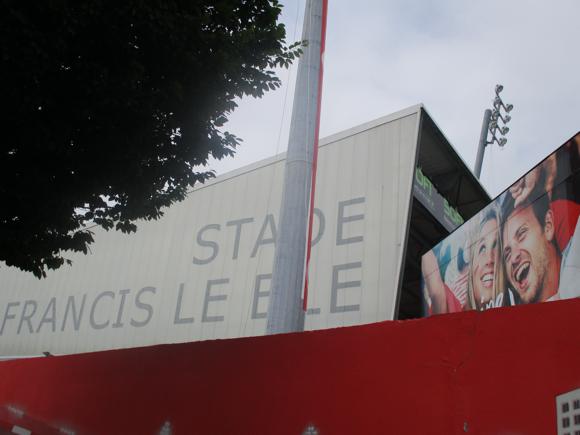

Home of Brest football for nearly a century, the Stade Francis-Le Blé was the smallest of the 20 Ligue 1 grounds in 2019-20. Holding 15,000 and still looking defiantly old-school despite an overhaul in 2010, this compact stadium consists of three roofed stands and one uncovered end, rapidly opened for the last match of the successful 2018-19 campaign.
Tickets for the game with Niort having sold out in a few hours, the club negotiated a deal with Brittany Ferries to have the Tribune Plein Ciel furnished with signature red seating for 2,000 more home fans to witness the promotion to Ligue 1. The ‘Open Sky’ Stand had not been used since Brest’s last Ligue 1 campaign of 2012-13.


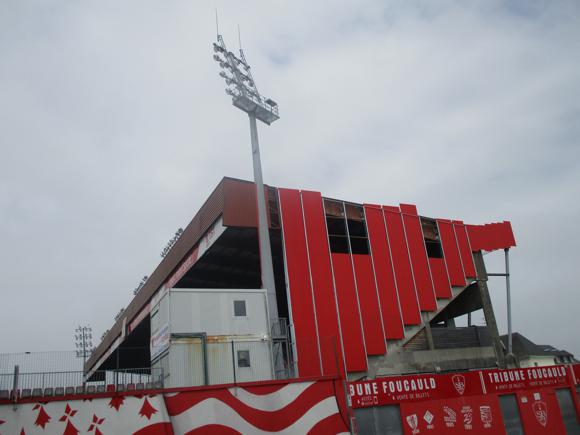
This northern end of the ground is divided, a third of it given over to 700 visiting supporters in sectors 5-6 nearest the Tribune Foucauld. Exposed to the wind and rain blowing in off the Atlantic nearby, it doesn’t offer the most edifying Saturday night out for away fans who’ve journeyed to the very western tip of France to watch a football match.
Brest fans in the Kop, the south end Tribune Quimper, are no strangers to long away trips, of course – Plymouth is closer than all other Ligue 1 grounds in 2019-20, nearest rivals Rennes excepted. Red and white flags are also flown from the seats in the sideline Tribune Crédit Mutuel Arkéa, completely rebuilt in 2010. Sector 1 nearest the home end is a Kop all of its own.
The Foucauld opposite houses the press and VIPs.
getting there
Going to the stadium – tips and timings
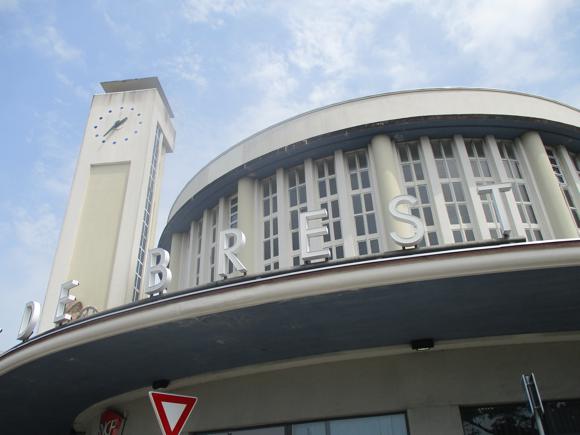

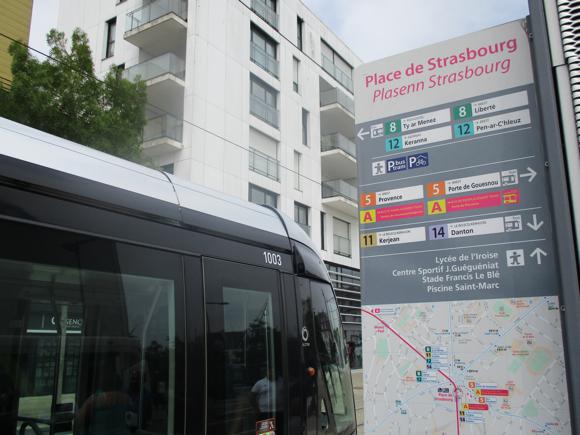
The stadium is an easy glide up from town on tramway A, alighting at Place de Strasbourg, five stops up from focal Liberté. Head up to the roundabout, then veer right down rue de Quimper – the stadium is 2mins ahead on the left. If you’re coming directly from the airport, the shuttle bus runs to the terminus of tramway A at Porte de Guipavas – Place de Strasbourg is six stops away.
If you’re walking from town, the climb up main rue Jean-Jaurès from town is pretty steep – coming back, it’ll take about 15mins. If it’s an evening game, the tramway will have stopped running by the time you get to Place de Strasbourg after the final whistle.
getting in
Buying tickets – when, where, how and how much
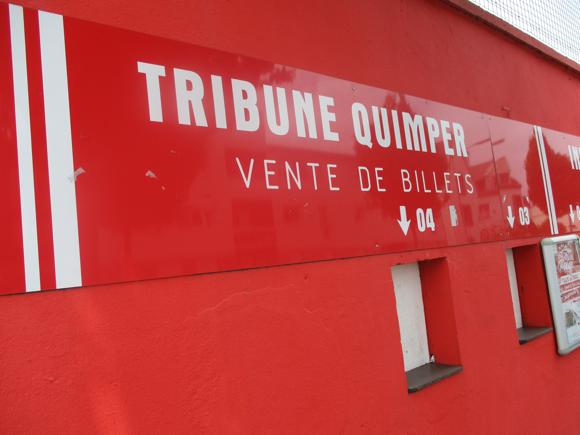

Advance tickets are sold at the club shop (71 rue Amiral Romain Desfosses, Kergaradec; Mon-Sat 10am-7pm), at Le Penalty bar (see below) opposite the ground, online through the club and via regular networks France Billet and Ticketmaster.
On match days, the stadium ticket offices open 1hr 30mins before kick-off but availability isn’t a given – check with the club on +33 2 98 02 20 30 or send a contact form.

Prices fall into four categories of match (‘Légende’ against PSG and OM, ‘Gala’ against Nantes, Rennes, OL and Saint-Étienne, ‘Sensation’ and ‘Passion’ the rest) and nine areas of the ground, four alone in the sideline Tribune Foucauld. An average price there is around €40-€50, going as low as €20 for the poorest seat against, say, Reims.
If there are any places in the home end, Quimper, these run at €15-€28. Admission to the Brittany Ferries end (€9-€25) means you’ll be open to the elements – and it does rain in Brest. A lot.
Discounted prices, tarif réduit, of around 25%, are for under-18s and students. Tarif kids at 50% is for under-10s.
what to buy
Shirts, kits, merchandise and gifts
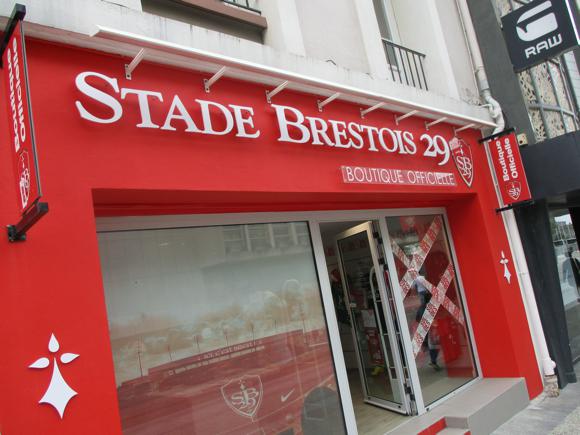

Now at a larger out-of-town store at the retail hub of Kergaradec (71 rue Amiral Romain Desfosses), the Stade Brestois 29 Boutique Officielle (Mon-Sat 10am-7pm) is awash with red and white.
The home top for 2024-25 is all red with the club and sponsors’ logos in white. Second kit is white with thin red bars across, third-choice blue offset by a grey dotted pattern. Both these change strips feature the sponsor’s name of Malo Yoghurt, a image of the château of St Malo spread across the player’s chest. Look out, too, for artefacts displaying the fearsome flag-bearing mascot Zef le Pirate.
Where to Drink
Pre-match beers for fans and casual visitors
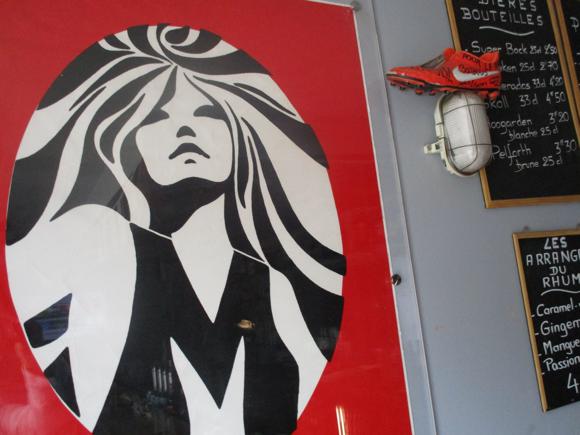





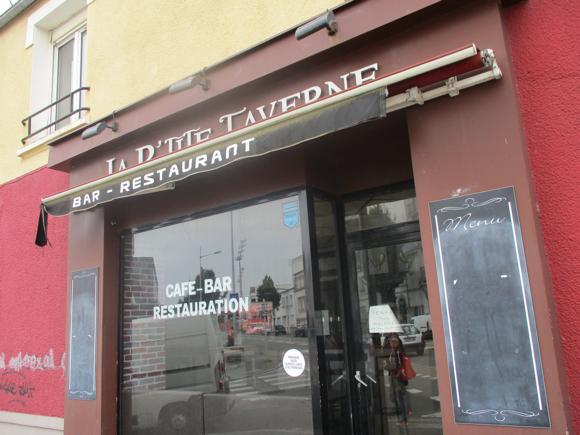
Pre-match drinking is sacrosanct at Stade Brestois. Just before you come to Place de Strasbourg tram stop, on the right-hand side the Bar éc (as in Écossais, Scottish) at 243 rue Jean-Jaurès is a great little spot, music-savvy, fun and football-focused. Matches screened, too. At Portuguese-run Le Gulf Stream diagonally opposite, you can play Benfica v Porto at table football or do battle at pool.
Turning left down rue de Gouesnou at the place de Strasbourg roundabout, Le Bistrot de Paris on the left at No.6 also has a pool table while Le Derby just down rue de Paris is a pretty grim betting haunt.
Heading down rue de Quimper towards the stadium, the Relais Celton on the right is an upper mid-range restaurant specialising in traditional cuisine – reserve a table on match days. Further down, La P’tite Taverne awaits new ownership.

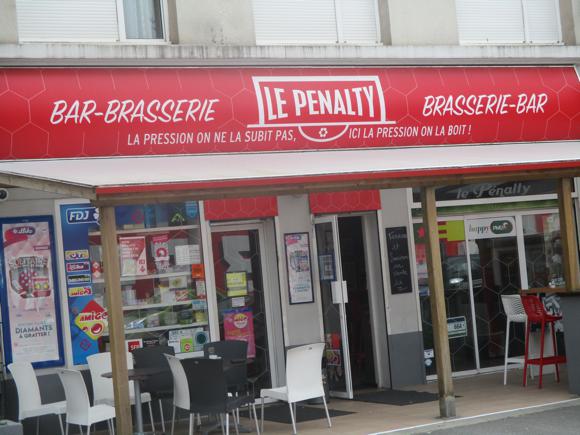
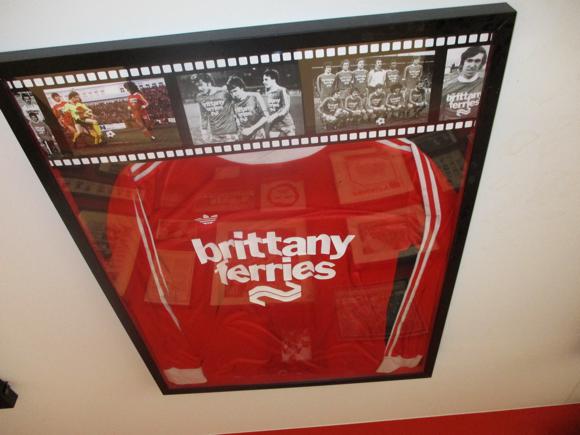
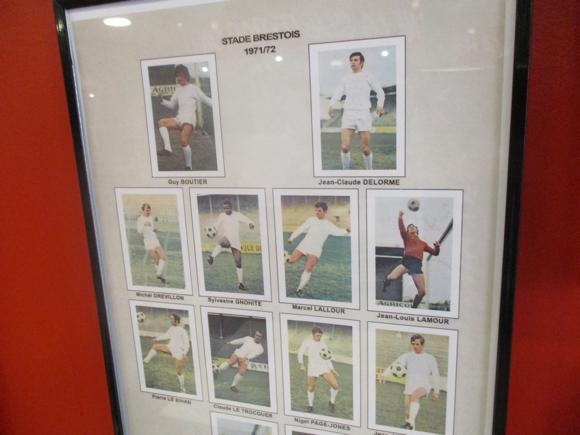

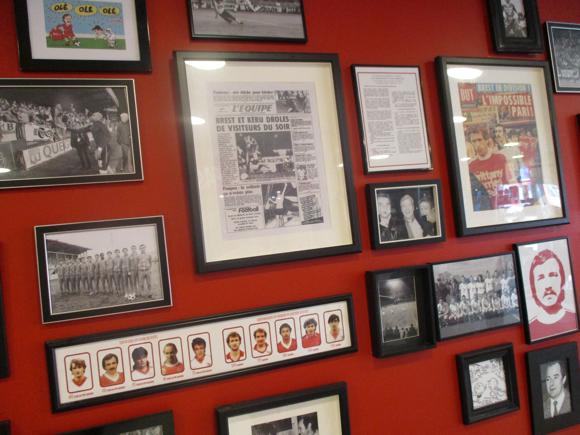

Save all your kisses, then, for Le Penalty. Slap opposite the home Quimper end of the Stade Francis-Le Blé, this simply wonderful pre-game bar does so many things right. Blessed with a terrace, friendly regulars and equally welcoming staff, it screens live games, sells match tickets and its U-shaped counter allows many to crowd in and get served pdq.
The décor is an education in itself, a framed pictorial history of Stade in shirt, sticker and fanzine form. Goudale ales from Arques are available by the bottle but everyone usually sticks with demis of standard lager. As the slogan, running over the bar in proud red and white, says: La pression on ne la subit pas, on la boit – ‘We don’t submit to pressure, we drink it draught!’



